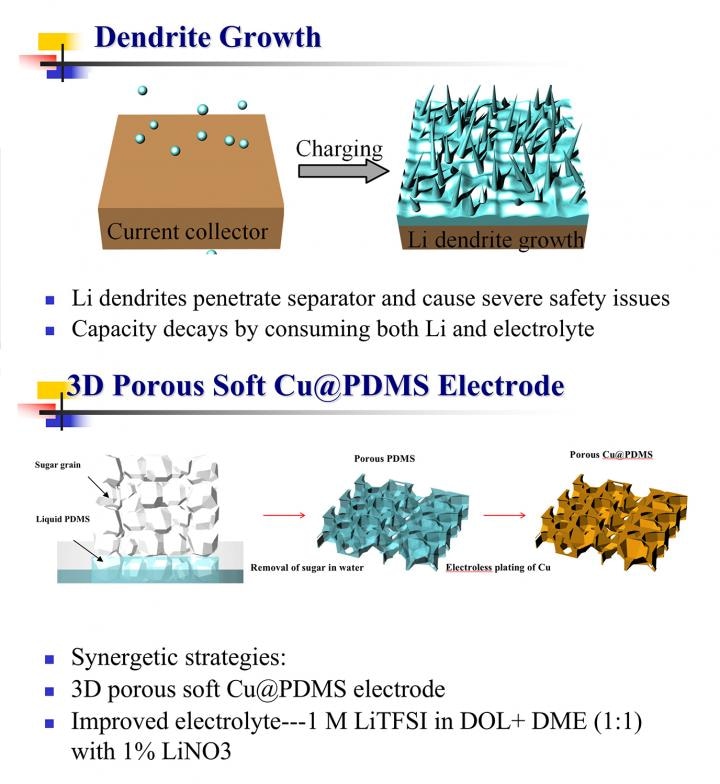Mar 7 2018
Lithium-metal batteries are among the most favorable candidates for high-density energy storage technology in an ever-increasing range of digital "smart" devices and electric vehicles, but unrestrained lithium dendrite growth, which results in weak recharging capability and safety risks, presently tempers their potential.
 This is dendrite mitigation for lithium batteries. (Image credit: Arizona State University)
This is dendrite mitigation for lithium batteries. (Image credit: Arizona State University)
Dendrites are needle-like growths that develop on the surface of lithium metal, which is used as the anode, or negative electrode, of a battery. They induce undesirable side reactions that decrease energy density, and at worst, cause shorting of the electrodes that can result in fires or explosions.
New research from Arizona State University that involves employing a three-dimensional layer of Polydimethylsiloxane (PDMS), or silicone, as the substrate of lithium metal anode, has been found to lessen dendrite formation and stands to radically extend battery life as well as diminish safety hazards.
According to Hanqing Jiang, a professor in Arizona State University's School for Engineering of Matter, Transport and Energy and a lead researcher on a paper published in Nature Energy, the findings have applicability for both lithium-ion and lithium-air batteries, as well as implications for other metal-anode-based batteries.
Almost all metals used as battery anodes tend to develop dendrites. For example, these findings have implications for zinc, sodium and aluminum batteries as well.
Hanqing Jiang
Jiang said he and the research team, instead of approaching the problem from a material or electrochemical standpoint, sought for solutions as mechanical engineers. "We already know that tiny tin needles or whiskers can protrude out of tin surfaces under stress, so by analogy, we looked at the possibility of stress as a factor in lithium dendrite growth."
The first phase of research involved incorporating a layer of PDMS to the bottom of battery anode. "There were remarkable reductions in dendrite growth," said Jiang. The researchers learned that this is directly connected to the fact that stress collected inside the lithium metal is relieved by the deformation of the PDMS substrate in the form of "wrinkles."
"This is the first time convincing evidence shows that residual stress plays a key role in the initiation of lithium dendrites," said Jiang.
Besides gaining a vital understanding of the lithium dendrite growth mechanism, Jiang's group also formulated a smart way to utilize the phenomenon to lengthen the life of lithium-metal batteries while preserving their high energy density. The solution is to give PDMS substrate a three-dimensional form with plenty of surfaces.
Envision sugar cubes that contain a lot of small internal pores. Inside these cubes, the PDMS forms a continuous network as the substrate, covered by a thin copper layer to conduct electrons. Finally, lithium fills the pores. The PDMS, which serves as a porous, sponge-like layer, relieves the stress and effectively inhibits dendrite growth.
Hanqing Jiang
By synergistically combining with other lithium dendrite suppression methods such as new electrolyte additives, the finding has broad implications for making lithium-metal batteries a safe, high-density, long-term energy storage solution. Potential applications range from personal electronic devices to powering electric cars for exceptionally longer periods to being the backup electric supply for solar power grids.
Professor Ming Tang, Research Team Member - Rice University
Partners in the research include members of Jiang's group at ASU: Xu Wang, Wenwen Xu, and Haokai Yang; Wei Zeng, a visiting ASU Scholar co-advised by Jiang and Professor Huias Dai at Hunan University, China, and researchers from Rice University including Dr. Liang Hong, Fan Wang and their advisor Ming Tang.